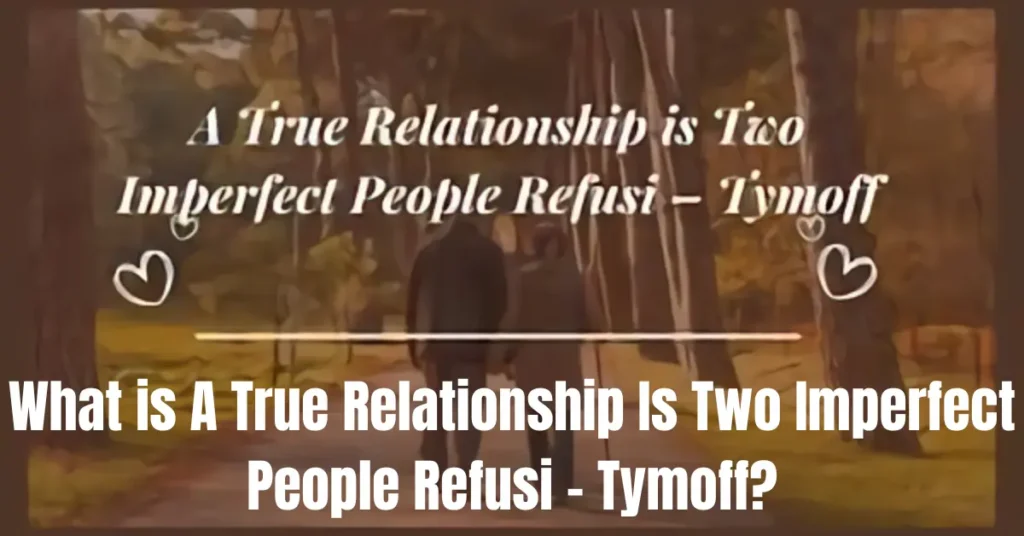Introduction
In a world often obsessed with perfection, the concept of A True Relationship Is Two Imperfect People Refusi – Tymoff to give up is a refreshing reminder of what really matters. It’s not about flawless individuals or fairy-tale romances but about two people embracing their imperfections and choosing each other, day after day.
This blog explores the essence of such relationships, where love, commitment, and resilience triumph over unrealistic ideals. Join us as we delve into what makes these relationships not just enduring but deeply meaningful.
What is A True Relationship Is Two Imperfect People Refusi – Tymoff?

- “A True Relationship Is Two Imperfect People Refusi – Tymoff” encapsulates the idea that genuine connections thrive on authenticity rather than flawlessness.
- It emphasizes the beauty of accepting each other’s imperfections and choosing to grow together despite challenges. This philosophy encourages partners to support one another through highs and lows, fostering a bond built on understanding, empathy, and mutual respect.
- By embracing their imperfections, individuals in such relationships cultivate a deeper sense of connection and resilience, making their journey together truly meaningful.
You May Also Like It
Instagram Par Follower Kaise Badhaye With Can Follow Website – Veganov Trichy
1000+ Free Instagram Story Views In 2024 – Veganov Trichy
How To Increase Followers On Instagram With TakipciGir New Update 2024
Why “A True Relationship Is Two Imperfect People Refusi – Tymoff” Is Important
Embracing Authenticity
- Genuine Connection: It emphasizes the importance of authenticity in relationships, where partners feel safe to be their true selves without fear of judgment.
- Building Trust: By accepting imperfections, trust is nurtured as both partners feel validated and respected for who they are.
Cultivating Resilience
- Navigating Challenges: Imperfect relationships teach resilience, as partners learn to navigate difficulties together rather than giving up at the first sign of trouble.
- Personal Growth: Facing imperfections encourages personal growth as individuals and as a couple, fostering continuous improvement and adaptation.
Strengthening Emotional Bonds
- Deeper Connection: When imperfections are acknowledged and accepted, emotional bonds deepen as partners share vulnerabilities and support each other.
- Long-Term Satisfaction: Couples who embrace imperfections often report higher satisfaction and fulfillment in their relationships over the long term.
Challenging Unrealistic Ideals
- Rejecting Perfectionism: It challenges societal pressures and unrealistic ideals about relationships, promoting a more realistic and sustainable view of love and partnership.
- Celebrating Uniqueness: Each person’s imperfections contribute to the uniqueness of the relationship, celebrating differences rather than seeking uniformity.
Promoting Mutual Growth
- Learning and Evolving: Imperfect relationships foster an environment where both partners learn from each other’s strengths and weaknesses, promoting mutual growth and development.
- Creating Lasting Bonds: By refusing to give up on each other despite imperfections, couples create lasting bonds based on shared experiences and overcoming challenges together.
Step-by-Step Guide to “A True Relationship Is Two Imperfect People Refusi – Tymoff”

Embrace Your Own Imperfections
- Self-Acceptance: Recognize and accept your own imperfections and vulnerabilities.
- Be Authentic: Be genuine and true to yourself in the relationship.
Communicate Openly and Honestly
- Share Feelings: Express your thoughts and emotions openly with your partner.
- Listen Attentively: Listen actively and empathetically to your partner’s concerns and feelings.
Practice Empathy and Understanding
- Put Yourself in Their Shoes: Try to understand your partner’s perspective and feelings.
- Offer Support: Provide emotional support and encouragement during challenging times.
Learn and Grow Together
- Continuous Improvement: Be open to learning from mistakes and growing together as a couple.
- Set Goals: Establish common goals and aspirations for the relationship and support each other in achieving them.
Resolve Conflicts Constructively
- Healthy Communication: Use constructive communication techniques to address disagreements.
- Seek Resolution: Work together to find mutually beneficial solutions to conflicts.
Celebrate Successes and Milestones
- Acknowledge Achievements: Celebrate each other’s successes and milestones, no matter how small.
- Create Memories: Build positive memories and experiences together to strengthen your bond.
Cultivate Trust and Respect
- Honesty and Transparency: Build trust through honesty and transparency in your interactions.
- Respect Differences: Respect each other’s differences and individuality within the relationship.
Stay Committed Through Challenges
- Stay Strong: Face challenges together with resilience and determination.
- Refuse to Give Up: Commit to working through difficulties instead of giving up on the relationship.
Seek Balance and Support
- Balance Independence and Togetherness: Maintain a healthy balance between independence and being a couple.
- Seek Support: Lean on each other and seek support from trusted friends or professionals when needed.
Reflect and Appreciate
- Gratitude: Express gratitude for each other and the education relationship regularly.
- Reflect on Growth: Reflect on how you’ve grown individually and as a couple through embracing imperfections.
Advantages
Authenticity and Depth
- Genuine Connection: Embracing imperfections fosters authenticity, allowing for deeper emotional connections between partners.
- Realistic Expectations: It promotes realistic expectations in relationships, based on acceptance rather than idealized perfection.
Resilience and Growth
- Building Resilience: Couples learn to navigate challenges together, strengthening their bond and resilience.
- Personal Growth: Individuals grow personally by confronting and accepting their imperfections within the relationship.
Enhanced Communication
- Openness: Encourages open and honest communication about feelings, concerns, and expectations.
- Conflict Resolution: Facilitates constructive conflict resolution, fostering a healthier relationship dynamic.
Mutual Support and Understanding
- Empathy: Promotes mutual understanding and empathy as partners support each other through vulnerabilities.
- Shared Journey: Couples feel united in facing life’s ups and downs together, enhancing emotional support.
Disadvantages
Potential for Misunderstandings
- Interpretation of Imperfections: Miscommunication or misunderstandings may arise from differing interpretations of imperfections.
- Insecurities: Unresolved insecurities about one’s imperfections could lead to conflicts or emotional distance.
Struggle with Societal Pressures
- External Expectations: Pressure from society or peers to conform to idealized relationship standards may cause stress.
- Comparison: Comparing one’s relationship to others’ perceived perfection can create dissatisfaction.
Emotional Vulnerability
- Fear of Rejection: Fear of rejection or judgment based on revealing vulnerabilities can hinder open communication.
- Trust Issues: Existing trust issues may be exacerbated if partners struggle with accepting each other’s imperfections.
Growth Requires Effort
- Continuous Effort: Maintaining a healthy relationship despite imperfections requires ongoing effort and commitment.
- Personal Development: Individual growth may require stepping out of comfort zones, which can be challenging.
What does it mean to be in a true relationship with imperfect people?
In a true relationship with imperfect people, it means accepting each other as you are, flaws and all. It’s about loving and supporting your partner despite their imperfections, and them doing the same for you. This kind of relationship focuses on authenticity rather than trying to be perfect.
How can embracing imperfections strengthen a relationship?
Embracing imperfections can strengthen a relationship by fostering deeper trust and understanding. When partners accept each other’s flaws, they feel safe to be themselves. This openness leads to better communication, empathy, and a stronger emotional connection.
What if I struggle with accepting my partner’s imperfections?
It’s normal to have challenges accepting your partner’s imperfections. Communication is key here—talk openly about your feelings and listen to your partner’s perspective. Try to understand that imperfections are a part of being human, and focusing on your shared love and goals can help overcome these challenges.
How do you handle conflicts in a relationship based on imperfections?
Handling conflicts involves respectful communication and empathy. Listen actively to your partner’s concerns and express your own feelings calmly. Focus on finding solutions together rather than placing blame. Remember, conflict is natural, and resolving it constructively can strengthen your relationsh
Is it okay to have doubts or insecurities in a relationship?
Yes, it’s okay to have doubts or insecurities in a relationship, especially when dealing with imperfections. What’s important is how you address these feelings. Talk honestly with your partner about your concerns and work together to build trust and reassurance.
How can we grow together in a relationship with imperfections?
Growing together involves supporting each other’s personal growth and shared goals. Celebrate successes and learn from challenges as a team. Stay committed to working through difficulties and continue communicating openly. This journey of growth can deepen your connection over time.
What role does forgiveness play in a relationship with imperfections?
Forgiveness is crucial in a relationship with imperfections. It allows partners to move forward from mistakes and misunderstandings. By forgiving each other and learning from past experiences, you can strengthen trust and build a more resilient relationship.
Conclusion
“A True Relationship Is Two Imperfect People Refusi – Tymoff” teaches us that love isn’t about perfection—it’s about acceptance and growth. Embracing each other’s imperfections strengthens trust, deepens emotional bonds, and fosters a more genuine connection.
By navigating challenges together and celebrating each other’s uniqueness, couples can build a fulfilling and resilient relationship that stands the test of time. Remember, it’s the journey of learning, accepting, and loving each other that truly defines a meaningful relationship.
Bonus Points
- Celebrating Uniqueness: Each person’s imperfections contribute to the richness and uniqueness of the relationship, making it one-of-a-kind.
- Shared Growth: Embracing imperfections encourages personal growth for both partners as they learn from each other’s strengths and weaknesses.
- Resilience Building: Working through imperfections together builds resilience, preparing couples to handle future challenges with greater strength.
- Deeper Intimacy: Accepting vulnerabilities and imperfections fosters a deeper emotional intimacy and understanding between partners.
- Inspiring Others: By embracing imperfections openly, couples can inspire others to prioritize authenticity and meaningful connections in their own relationships.
- Empathy and Compassion: It promotes empathy and compassion as partners navigate each other’s imperfections with understanding and support.
- Longevity: Relationships built on acceptance and commitment to growth often have longevity, as both partners are willing to evolve together over time.
- Less Pressure: There’s less pressure to conform to societal standards of perfection, allowing couples to focus on what truly matters: their love and connection.
- Learning Together: Imperfect relationships provide ongoing opportunities for learning about oneself and each other, creating a continuous journey of discovery.
- Memorable Moments: Embracing imperfections can lead to unique and memorable moments of connection and joy, highlighting the beauty in everyday life.
You May Also Like It
Trendzguruji.me – Computer, Cyber, Awareness, SEO, Health & Beauty Guide
TrendzGuruji.me Cyber Insights Hub
“What’s Up with Emerald Gems? Let’s Talk”
